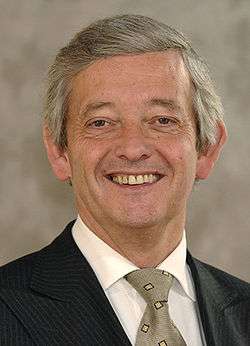Eimert van Middelkoop
Eimert van Middelkoop (Dutch pronunciation: [ˈɛimərt fɑn ˈmɪdəlkoːp];[1] born 14 February 1949) is a Dutch politician in the ChristianUnion (CU) party. From 2007 to 2010, he was Minister of Defence in the fourth Balkenende cabinet. In 2010, he served as the Minister of Housing, Communities and Integration (Wonen, Wijken en Integratie).[2]
Early life
After high school, van Middelkoop attended what is now Erasmus University, earning a B.A. in Sociology in 1971. In 1971 and 1972, he was a teacher at the Reformed Social Academy in Zwolle. He was exempt from military draft for being indispensable as staff member of the Reformed Political League in the House of Representatives.[2]
Politics
Van Middelkoop became a member of the House of Representatives in 1989, while affiliated with the Reformed Political League. Since 2000, he has been aligned with the ChristianUnion (ChristenUnie), which was the product of a fusion of the Reformatory Political Federation (RPF) and the Reformatory Political Federation (GPV). He specialised in foreign and military affairs, prepared the inquiry by the House of Representatives into the role of the Netherlands in the fall of Srebrenica. He lost his seat in the House of Representatives in the 2002 elections.
From 2003 until 2007, van Middelkoop was a member of the Senate of the Netherlands. In the 2006 elections, the ChristianUnion party doubled its seats and joined the fourth Balkenende cabinet. Van Middelkoop became Minister of Defence in 2007.
In September 2008, he told the Dutch opinion magazine, Vrij Nederland, that he would have been very unhappy to have joined the army. Because of this and other remarks, he received criticism from military labour unions, who said that Van Middelkoop had lost his credibility.[3][4]
Decorations[2]
- Knight of the Order of Orange-Nassau
- Officer of the Order of Orange-Nassau
- Ghazi Mir Bacha Khan Medal (Afghanistan)
References
- ↑ In isolation, van is pronounced [vɑn].
- 1 2 3 House of Representatives biography (in Dutch)
- ↑ "Van Middelkoop was blij dat hij niet in dienst hoefde" (in Dutch). NRC Handelsblad. 23 September 2008. Retrieved 22 May 2014.
- ↑ "Van Middelkoop moet praten met militaire vakbonden" (in Dutch). NRC Handelsblad. 25 September 2009. Retrieved 22 May 2014.
External links
- (Dutch) Parliament biography (in Dutch)
| Party political offices | ||
|---|---|---|
| Preceded by Gert Schutte |
Parliamentary leader - Reformed Political League House of Representatives 2001 |
Succeeded by Party Disbanded |
| Government offices | ||
| Preceded by Henk Kamp |
Minister of Defence 2007-2010 |
Succeeded by Hans Hillen |
| Preceded by Eberhard van der Laan |
Minister of Integration and Housing 2010 |
Succeeded by Melanie Schultz van Haegen |

